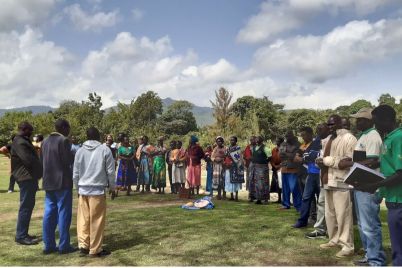Based in New York with farms in Eastern Nepal, the company Nepal Tea Collective is working to create a more transparent and equitable supply chain from tea farm to consumer.
When Nishchal Banskota’s father founded the Kanchanjangha Tea Estate in 1984, he wanted to lift his community in Phidim in eastern Nepal out of poverty. After taking over the estate in 2016, Banskota is still working toward the goal.
“Tea is not just a beverage. It is a catalyst for social change,” Banskota tells Food Tank.
In 2016, Banskota inherited the estate and launched Nepal Tea. The company sells organic teas hand-plucked on the estate in the foothills of Mount Kanchenjunga. They package teas in biodegradable, handwoven bamboo and ship internationally.
Although bamboo packaging is more time and labor intensive, Nepal Tea can employ a larger share of the community. Banskota believes consumers are willing to pay higher prices for products with greater social benefit. When it comes to business decisions, “uplifting communities is always a factor,” Banskota says.
Through vertical integration, Nepal Tea reports that they can better control the entire supply chain from farm to consumer. The company partners with regional tea producers, helping them to ensure the quality of their teas, as well as distribute a greater share of revenues to producers. Banskota tells Food Tank, “We take their product as a work of art and science and respect the tea farmers as artists.”
In 2019, the company launched the Nepal Tea Foundation in an effort to expand access to education and employment in its community through three key focus areas: poverty, literacy, and community growth. The company’s current goal is to get 1 million farmers out of poverty within this generation. Transforming into a public benefit organization, Banskota tells Food Tank, holds Nepal Tea to a high degree of accountability and transparency. “We want to be held responsible.”
Tea is the most consumed beverage in the world after water, according to the U.N. Food and Agriculture Organization, and tea consumption rose during the COVID-19 pandemic. The Nepal Trade and Export Promotion Centre estimates that Nepal produces over 52 million pounds of tea per year.
According to the South Asia Alliance for Poverty Eradication, many of Nepal’s tea farmers face a number of challenges including compensation under the minimum wage, insufficient food and housing, inadequate equipment, and exposure to strong pesticides without personal protective equipment.
A survey from the Central Bureau of Statistics and the Nepal Tea and Coffee Development Board reveals that 3 million workers are engaged in Nepal’s tea industry, but only 3,000 are permanent workers. Without permanent work status, temporary workers cannot access the minimum wage. The survey also finds that tea industry leaders often fail to uphold Nepal’s laws that entitle workers to permanent status after 240 days. These issues disproportionately affect women who account for over 74 percent of the tea industry’s labor force.
In response to these issues, Banskota tells Food Tank that since the company’s conception, the company’s leaders have asked themselves, how can we create thriving, sustainable communities in tea-producing regions?
The COVID-19 pandemic and climate crisis have presented additional obstacles to this question, including greater economic vulnerability and decreased productivity.
At the onset of the pandemic, Nepal Tea responded by establishing a relief fund for tea farmers and their families. With the relief fund, Nepal Tea provided 100 community members with housing, 2,400 scholarships, and 182 cows as additional sources of income.
According to Banskota, the company also hears from farmers that the climate crisis threatens tea production. Nepal Tea’s farmer partners report unprecedented drought and hailstorms that lead to lower productivity and place farmers’ livelihoods in jeopardy. “Farmers tell us they’ve lost close to 15 percent of their yields to hailstorms.”
But tea farmers can also be part of the solution to the climate crisis. Research in the Journal of Environmental Management finds that each acre of tea has the potential to sequester over 31,000 pounds of carbon dioxide per year—equivalent to removing nearly 7,000 vehicles from roads. Nepal Tea’s farmers also never use chemicals such as pesticides or fertilizers, and the company helps them obtain organic certification.
Looking ahead, Nepal Tea plans to hire new underrepresented tea farmers, plan more events to engage tea farmers with consumers, diversify its crops and introduce new spices and herbs, and open a school. The company is also working to build a blockchain ledger system to give consumers more information about every product. This represents a key piece of what they call a radical transparency movement.
Source by: https://foodtank.com/news/2022/05/tea-catalyst-for-social-change/




